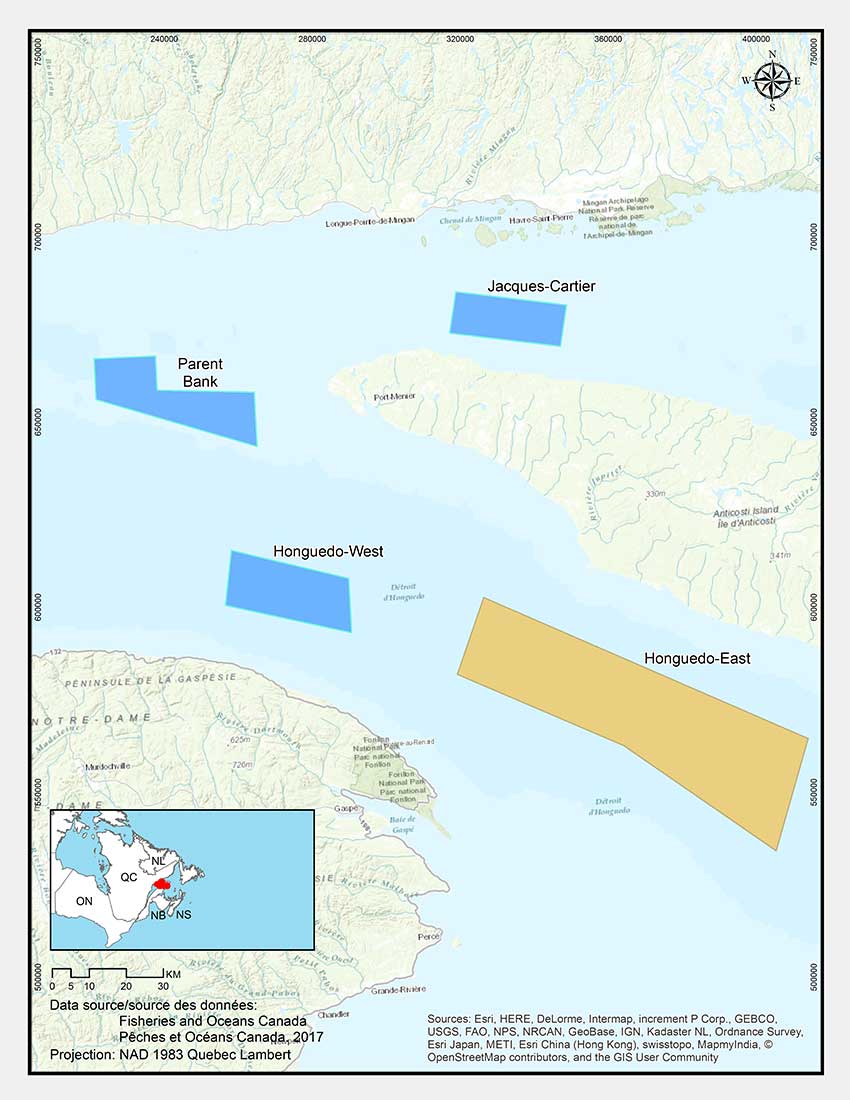Eastern Honguedo Strait Coral and Sponge Conservation Area
- Location
- Estuary and Gulf of St. Lawrence Bioregion (Quebec, New Brunswick, Nova Scotia, Prince Edward Island, Newfoundland and Labrador)
- Approximate Size (km2) contribution to Marine Conservation Targets
- 2,338 km2
- Approximate % coverage contribution to Marine Conservation Targets
- 0.04%
- Conservation Objective
- Cold-water coral and sponge protection
Ecological Components of Interest
Species of regional importance: cold-water corals and sponges
- Why they are important: Cold-water corals and sponges are fragile, slow to recover, structure-providing species.
Habitat that is important to biodiversity conservation: cold-water corals and sponges
- Why they are important: This conservation area is considered exceptional because it includes high concentrations of four sea-pen species, namely Halipteris finmarchica, Anthoptilum grandiflorum, Pennatula grandis and Pennatula aculeata, as well as sponges (Porifera spp.). This is the only area in the Gulf of St. Lawrence with a high concentration of the large sea pen, Halipteris finmarchica. These species create structures that provide diverse habitat for many other species.
Prohibitions
The ecological components of interest are effectively conserved through the following prohibitions:
All fishing that uses bottom-contact gear, such as bottom trawls, dredges, bottom seining, traps, gillnets, and bottom longlines.
Other Considerations
No human activities that are incompatible with the conservation of the ecological components of interest may occur or be foreseeable within the area.
Environmental Context
This conservation area includes communities of sea pens and sponges classified as significant benthic areas (CSAS SAR - 2017/007) in the Estuary and Gulf of St. Lawrence bioregion. The area also includes other important biological features, such as a high concentration of Duva florida soft corals, the presence of two large structure-providing sponge species, Asconema foliatum and Suberites ficus, and at least three species of rays and wolffish.
High concentrations of these corals and sponges create habitat with complex structures that can provide refuge, feeding, and rearing areas for many marine species, thus supporting greater biodiversity.
Prohibiting bottom-contact fishing gear makes it possible to directly protect the fragile structure of corals and sponges, and can also help protect the fish and invertebrate species that rely on this habitat.

Eastern Honguedo Strait Coral and Sponge Conservation Area
Note:
Following the signing of the Canada–Quebec Collaborative Agreement to Establish a Network of Marine Protected Areas in Quebec in March 2018 (available in French), the governments of Canada and Quebec are evaluating the possibility of reinforcing coral and sponge conservation measures in the Gulf of St. Lawrence by prohibiting certain activities other than fishing in certain zones.
Learn more about the Northern Gulf of St. Lawrence marine protected area project.
- Date modified: